Musician Fela Kuti performs at Orchestra Hall in Detroit, Michigan, in 1986. (Photo by Leni Sinclair/Michael Ochs Archives/Getty Images)
“If government no fit do their job (PA PA PA!), Make them commot there,” is the chorus to the first track on the joint album between father and son Femi and Made Kuti, son and grandson of the late legendary Afrobeat pioneer Fela Kuti. Pà Pá Pà sets the tone for the Legacy+ album, which continues the Kuti legacy of using music as political and social commentary.
 Femi Kuti, son of the late Fela Anikulapo Kuti, with his son, Made, performs during the grand finale of 2018 Felabration that marked the 80th birthday of Fela Anikulapo-Kuti, the late Afro King, at the New African Shrine, Agidingbi, Lagos, on October 22, 2018. (Photo by Adekunle Ajayi/NurPhoto)
Femi Kuti, son of the late Fela Anikulapo Kuti, with his son, Made, performs during the grand finale of 2018 Felabration that marked the 80th birthday of Fela Anikulapo-Kuti, the late Afro King, at the New African Shrine, Agidingbi, Lagos, on October 22, 2018. (Photo by Adekunle Ajayi/NurPhoto)
Femi’s first half of the album is titled after the third track, Stop the Hate, and on that song and subsequent ones like Land Grab and Privatisation, he criticises government policies that continue to disadvantage and impoverish the masses, while enriching the political elite.
Yet as he sings in As We Struggle Everyday, Nigerians continue to recycle the same terrible leaders instead of holding them to account — “see these leaders wey suppose jail, na him my people don dey hail.”
The 10th and final track on Femi’s side of the album, Set Your Minds and Soul Free, encourages emancipation from any form of control, be it from corrupt leaders or religious fanatics, paving way for Made’s side of the album, his debut For(e)ward, which begins with the jazzy tune Free Your Mind, with the same admonition.
Next is Your Enemy, a song rallying against police brutality that also tries to understand why the police “are the way they are”, pointing listeners to the real enemy: the government.
On Different Street, Made is reflective on a monologue acknowledging that the Kutis have come full circle with this album: at 25, he is singing about the same things his grand-father sang about decades ago. Fela disapproved of the state of things under repressive military regimes.
And although Nigeria is a democracy now, it is the same Muhammadu Buhari, who locked up Fela over trumped-up charges in 1984, who is now ruling the country again — and with the same despotism. Sadly, it seems nothing has changed.
Made closes the album on an optimistic note with We are Strong, echoing his father’s sentiments in Young Boy/Young Girl, charging the youth to action and expressing belief in better times for the country, while hoping the path to revolution does not involve anarchy.
Legacy+ stays true to the Afrobeat sound in its protest and criticism of government ineptitude. It’s tempting to see the album as a response to the #EndSars movement but in reality, production began long before the October protests.
Despite the album’s importance to Nigeria’s current sociopolitical climate, its songs may never achieve mainstream popularity — music that does not sound like Wizkid’s and Davido’s is considered too esoteric — but it will surely find a home in the ears of Nigerians who have long agitated for songs with a conscience.